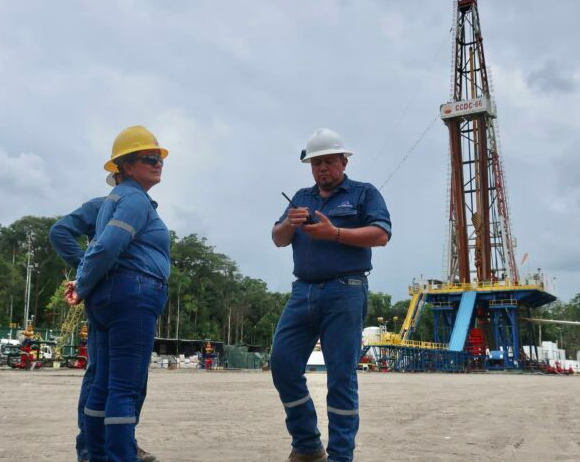A ‘yes’ vote for the Yasuní oil referendum could have far-reaching consequences for Ecuador
By Fernando Gimeno
Ecuador is facing a crucial moment for the future of its oil industry, a key pillar of the Andean nation’s economy.
In a referendum scheduled to coincide with an early general election on Aug. 20, voters will decide whether or not to ban crude production at an Amazon block located within the Yasuní National Park, one of the world’s biodiversity epicenters.

Workers at an oil production facility in the Yasuní National Park.
Of the roughly 480,000 barrels of oil produced daily in Ecuador, around 55,000 barrels (11 percent) come from Block 43-ITT (Ishpingo, Tambococha, Tiputini), which is currently Ecuador’s fourth largest by output and is projected to eventually become its most productive block.
Ecuador’s government receives $1.2 billion in net income annually from that block, according to state oil company Petroecuador, which operates the ITT and estimates that it holds 282 million barrels of reserves and resources. The company also says the government stands to receive $13.8 billion in net income from that block over the next 20 years.
The referendum comes after the Yasunidos environmental collective waged a 10-year legal battle to hold it and gathered more than 757,000 signatures. The group blames former president Rafael Correa for stopping a referendum in 2014 that would have prevented drilling in Yasuni before it began. They say Correa pressured the national elections council to invalidate many of the signatures after it became clear the referendum would prevail.
According to Yasunidos, the development of Block 43-ITT must be halted to protect a privileged ecosystem comprising more than 2,000 species of trees, 204 species of mammals, 610 types of birds, 121 species of reptiles, 150 amphibian species and more than 250 varieties of fish.
But Petroecuador CEO Ramon Correa says more than $1.8 billion has been invested to ensure protection for the surrounding ecosystem, that it is the one “best managed from an environmental standpoint.” “You can’t operate without perfect harmony with the environment and the communities,” he said, pointing out that unlike in other Petroecuador fields no gas flaring occurs at Block 43-ITT and that associated petroleum gas is instead used for electricity generation.
With a focus on using the minimum space possible, the installations in that block in northeastern Ecuador and the paths created in the rainforest occupy a total area of just 80 hectares (fewer than 200 acres), or less than 0.01 percent of the surface area of the national park.
This has been achieved through a cluster-type method in which wells branch out horizontally from a single drill site.
“We have 21 wells here per 3.2 hectares,” engineer Walter Paredes said at the Tambococha B platform, adding that with the previous technology the same number of wells would have had to be spread out over 31.5 hectares. Environmental safeguards also are in place, including paths that circumvent important trees.
With respect to oil spills, Petroecuador acknowledges 26 incidents since the start of production – small leaks that did not affect the natural surroundings. “I’ve never seen spills here,” Panenky Ohe Huabe, president of the Kawymeno indigenous community, one of seven located within the boundaries of that oil block, says.
A resident of that community, part of the Waorani indigenous group, Huabe says he still favors production to continue because Petroecuador has served as a source of employment and basic services. His position, however, differs from that of the leaders of the Waorani nationality, who are calling for a unified stance against crude extraction.
The promoters of the referendum say they also fear oil spills could harm the quality of life of two indigenous peoples who live in voluntary isolation in territories that border Block 43-ITT.
If the “yes” camp emerges victorious, Petroecuador would be forced to abandon that block within a year, a requirement that Paredes said would be “practically impossible” to meet.
__________________
Credit: La Prensa Latina





















